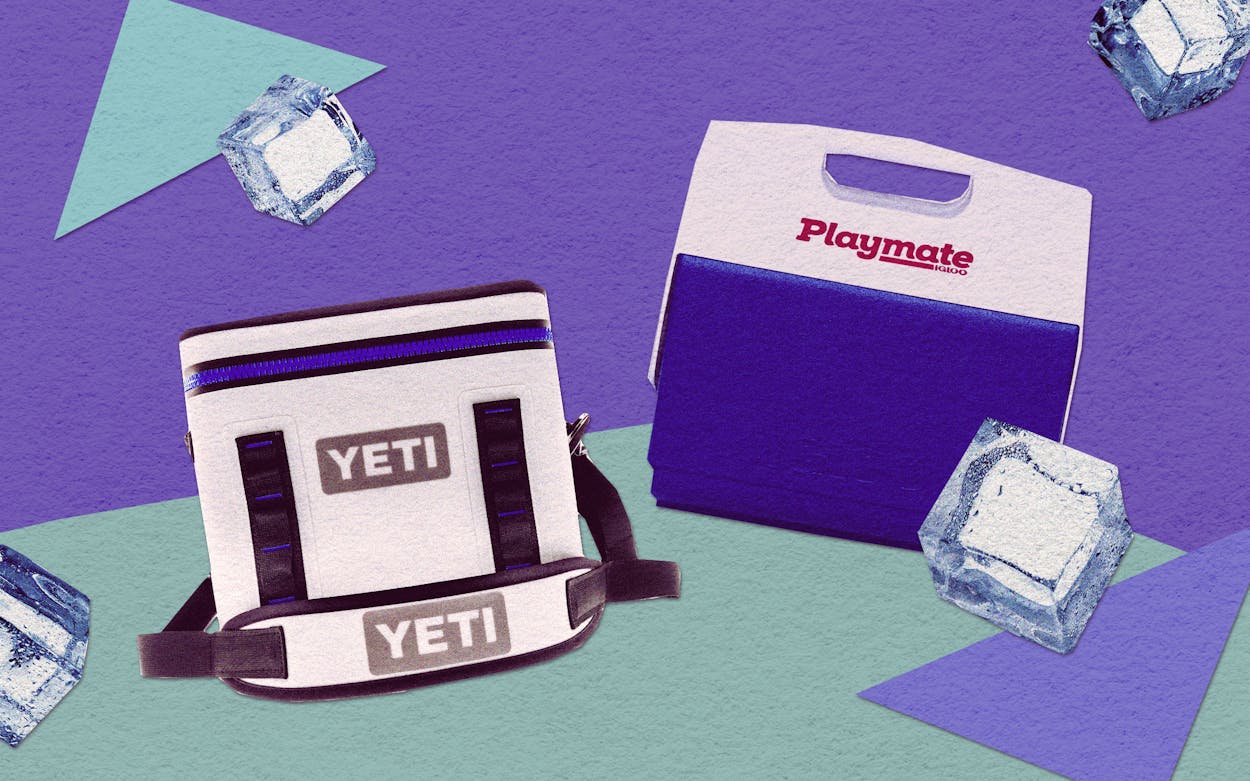Texans know the heat of their environment like Alaskans know snow, and every year we battle hot weather in all its forms. Windy and dusty, dry and still, wet and oppressive. If any state would need portable, chilled containers, it’s ours. The creators of Igloo and Yeti felt that way and forged their well-known brands right here in the Texas crucible.
But that’s about where the similarities melt away between these two companies, starting with their hometowns. Yeti hails from Austin, a scientifically formulated 290 percent hipper address than the Houston suburb of Katy, where Igloo was born.
Yeti is a teen heartthrob—a household name at just seventeen years old. The company launched around the time the first iPhone was announced. Baby boomer Igloo began in 1947, back before most Americans had a telephone attached to the wall.
The publicly traded Yeti has already become the eight-hundred-pound snow gorilla of the industry. Its market cap is over $3 billion. Igloo changed hands in 2021 for a sale price of just $677 million. That same year, Yeti’s $1.4 billion in sales more than tripled Igloo’s reported revenue.
Yeti burst onto the scene by marketing its coolers as apocalypse-grade, premium-priced pieces of luxury outdoor equipment. The company’s founders, Texan brothers Roy and Ryan Seiders were avid outdoorsmen themselves. After breaking one too many coolers on their own expeditions, they bet that expert hunters, anglers, and wealthy wannabes would drop an avalanche of cash for a stronger icebox. Depending on the model, Yeti coolers can support the weight of a fully grown man, are bear-proof, and come in sizes large enough to hold your deep-sea fishing catch.
All of that extreme engineering comes with extreme prices. Roy coolly refers to the pricing of Yeti’s first model as “ten x”—ten times what a typical cooler cost at the time. In spite of this barrier to entry, or maybe because of it, a Yeti became more than a functional way to keep your beer frosty. Owning one grew into a great source of “weekender braggadocio.” In 2017, the company opened a flagship store, complete with a bar and a stage for live music, in Austin’s South Congress neighborhood. Today the cheapest insulated tote on Yeti’s website is an $80 soft-sided lunch bag, akin to a brown paper sack on steroids (but glaringly vulnerable to bears).
On the other paw, Igloo’s lunch carriers mostly range from $13 to $30, prices that reflect the company’s everyman roots. Igloo’s first product, a metal water cooler, was designed with very specific Texans in mind—factory workers sweating in Houston’s humidity. And even as the firm’s catalog grew, its offerings remained decidedly mass-market. Perhaps its most iconic cooler, the under $50, white-topped, gabled Playmate, comes in a flurry of licensed designs covering every interest under the sun, from Wonder Woman to Whataburger to the Wu-Tang Clan.
That ubiquity is Igloo’s game. Sure, Yeti puts up the numbers now, but has it been there all your life? There’s a good chance an Igloo cooler has. Igloo’s website boasts that there’s one sitting in one out of every three garages in the U.S. The company sold the first plastic coolers, the first with wheels, and the first with speakers. You can mark iconic trends in American style simply by looking at vintage Igloo coolers. From incarnations of gleaming stainless steel to primary-color plastics to vaporwave jade, pink, and yellow, this brand has quietly been the family cooler for decades. Igloo has even launched “legacy coolers” and retro reproductions that top out at $240 but go as low as $20.
Inception and innovation at cooler companies may have become a Texas tradition, but has Yeti or Igloo actually established a place in Lone Star culture?
A rugged, outdoorsy Texan lugging a “quartered elk”–capacity (real marketing copy) Yeti Tundra 210 into the woods is unquestionably more badass than suburban soccer parents showing up to practice with orange slices in an Igloo. But even if Yeti’s cooler is cooler than being cool, even if it’s ice-cold for days, that functionality does not necessarily equate to being beloved. That comes from personal experiences.
I can still remember the springiness of the button on my family’s swivel-top Playmate cooler and the pinch it gave my clumsy little fingers if my timing was off. When it wasn’t collecting dust in our suburban Houston garage, it was sitting in the Port Aransas sand or under the bleachers at the ball field. The Capri Suns that kids of my generation so desperately craved after Little League and soccer could never have come from a yet-to-be-invented Yeti.
For now, Igloo has had far more opportunities to become frozen in Texans’ minds, to be part of the moments we hold dear, but Yeti may be built for the direction we’re headed. In this heat, though, we have to fill them both up with ice before we fill them with memories. A cooler can only do that if it’s the one you choose to bring along.






